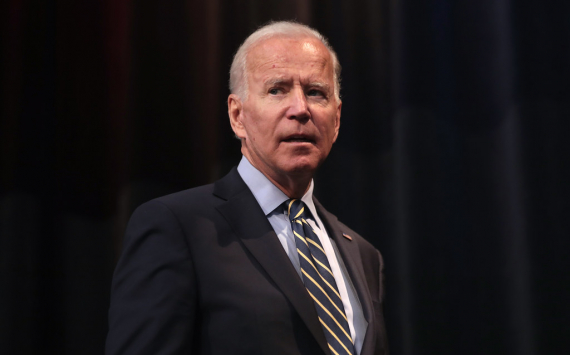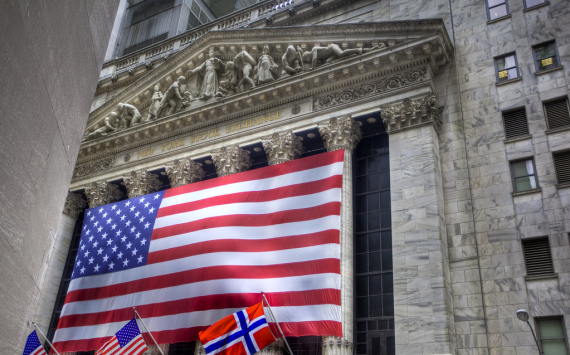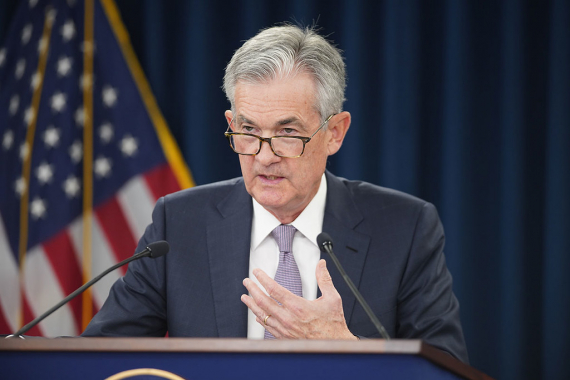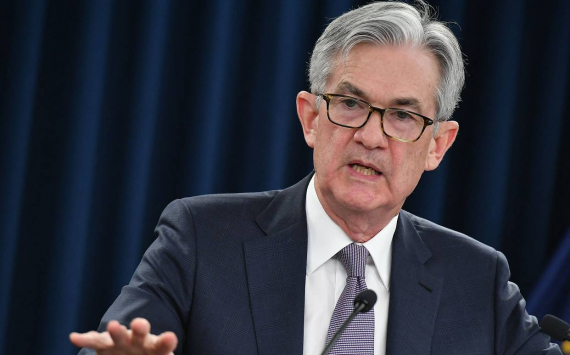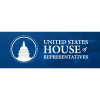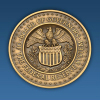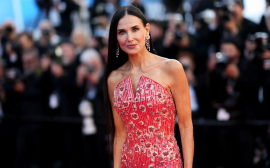- 1. Early Life
- 2. Early Career
- 3. Political Career
- 4. Economic philosophy
- 4.1. Monetary policy
- 4.2. Financial regulation
- 4.3. Housing finance reform
- 5. Criticism
- 6. Family & Personal Life
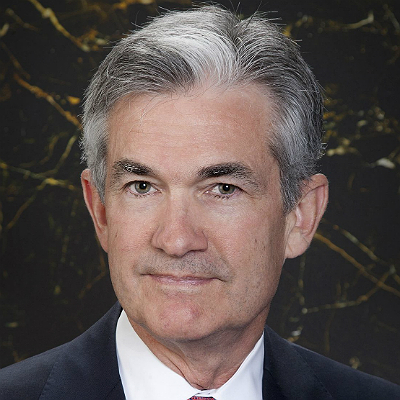
POWELL
Jerome
6th Chair of the Federal Reserve
Organization: Federal Reserve Board (Fed)
Date of Birth: 4 February 1953
person_view.holiday: Homemade Soup Day
Age: 72 years old
Place of Birth: Washington
Height: 182
Weight: 77
Zodiac sign: Aquarius
Profession: Chairman
Biography
Jerome Powell (02.04.1953) is an American former lawyer and former investment banker, who has been serving as the 16th chair of the 'Federal Reserve System' since February 2018. He is the first ‘Federal Reserve’ chairman who doesn’t have a degree in economics.
Early Life
Jerome Hayden “Jay” Powell was brought into the world on February 4, 1953, in Washington, D.C., to a lawyer Jerome Powell and Patricia Hayden. He has 5 siblings: Susan, Matthew, Tia, Libby, and Monica.
After finishing the Jesuit institute Georgetown Preparatory School in 1972, Powell entered Princeton University. He obtained his BA degree in politics in 1975. Following this, he continued his studies at the same university and submitted his senior thesis, titled 'South Africa: Forces for Change.'
In 1975, Powell interned as a legislative assistant under Pennsylvania senator Richard Schweiker for a year. Then he attended the Georgetown University Law Center and received his JD degree in 1979. He also served as the chief editing officer of the Georgetown Law Journal.

Powell in college days
Early Career
In 1979, Jerome Powell took a white-collar job under Judge Ellsworth Van Graafeiland of the United States Court of Appeals for the Second Circuit in New York. In 1981, he joined the international law firm of Davis Polk & Wardwell as a lawyer and continued to work there until 1983.
From 1983 to 1984, he worked at the law firm of Verbel and McMillen. After that, he turned towards investment banking and joined Dillon, Reed and Company in New York. In 1990, he left the investment bank as a vice president.
Political Career
Powell came back to Washington in 1990. He was appointed as the assistant secretary of the treasury for finance under the administration of President George H. W. Bush. He was later promoted to the post of the undersecretary of the treasury secretary, Nicholas F. Brady, the former chairman of Dillon Read and Company.
During his time in the administration, Jerome Powell oversaw the policy of financial institutions and the treasury debt market. He led the investigation of the case of fake trades of the investment bank Salomon Brothers. Under his leadership, Warren Buffett became the chairman of the company.
Under the new administration of President Bill Clinton, Powell was appointed as the office director of the Bankers Trust in 1993. He resigned in 1995, when some clients of the bank suffered heavy losses due to derivative deals.
In 1997, Powell became a partner at the direct investments and management of assets firm named The Carlyle Group. He established the Industrial Group for the Carlyle U.S. Buyout Fund. He quit it in 2005.
Then he found the private-investment firm Severn Capital Partners. In 2008, Powell joined the Global Environmental Fund for Private Investment and Venture Capital as a managing partner.
As a visiting professor (from 2010 to 2012) at the Washington-based think tank the Bipartisan Policy Center, Jerome Powell convinced Congressional Republicans to raise the debt limit after the United States debt ceiling crisis in 2011. He accepted $ 1 as his annual salary.
Powell's work with the "Political Center" impressed Barack Obama, and he nominated him to the" Board of Governors of the Federal Reserve System" in December 2011. He became a prominent "Republican" who actively participated in the internal debates of the "Federal Reserve System".
In May 2012, the Senate approved Powell's candidacy. Thanks to this, he became the first member of the opposition party to be nominated for this post since 1988. He assumed his duties at the "Federal Reserve System" on May 25, replacing Frederick Mishkin, who resigned before completing his term of office.
During his term with the ‘Federal Reserve,’ Powell voted for some percentage rate increases and supported the revision and strengthening of the bond-buying program implied during the 2008 financial crisis.
In January 2014, Powell was nominated for another term in the "Federal Reserve System". His candidacy was confirmed in June 2014. Powell's 14-year term will end on January 31, 2028.

Powell speaks at the Columbus School of Law in February 2015
Jerome Powell supported the "Dodd-Frank Wall Street Reform" and the "Consumer Protection Act", but suggested a more effective and strategic application. In October 2017, he recognized the importance of raising capital and liquidity requirements to improve the security of the financial system. He also proposed to revise the "Volcker Rule", saying that small banks should be excluded from this rule.
In November 2017, Donald Trump appointed Powell as the next chairman of the Federal Reserve System. The "Senate Banking Committee" confirmed his candidacy on December 5, 2017, with the only opposition being Democratic Senator Elizabeth Warren. Powell took office on January 23, 2018, thanks to strong bipartisan support.

President Donald Trump nominates Powell in November 2017
He assumed his duties as the 16th chairman of the "Board of Governors" of the "Federal Reserve System" on February 5.
Economic philosophy
Monetary policy
On joining the Fed, Powell was not considered a good expert in macroeconomics or monetary policy; and rather than having strong economic views, Powell was seen as a consensus builder, and a rational, fact-based problem solver who was willing to visit Capitol Hill frequently to communicate and listen to all opinions about the economy. The Fed's Bloomberg Intelligence spectrometer rated Powell as neutral in terms of monetary views (i.e. neither hawk nor dove). Powell was skeptical about the 3rd round of quantitative easing (or QE3), launched in 2012, although he eventually voted for it.
In Powell's first year as Fed chairman, he raised rates and tried to reduce the Fed's balance sheet (i.e., hawkish actions); in the second year, Powell resumed expanding the Fed's balance sheet (i.e., dovish actions), which led to an increase in the multiplicity of stock valuations to levels not seen since 1999-2000. Powell's actions to combat the financial consequences of the pandemic led to the fact that he more openly perceived asset bubbles as an acceptable consequence of his actions. The simultaneous bubbles created by Powell in 2019-2020 in the bond markets, stock markets and, in particular, in the housing markets, became known as the Bubble of Everything; Powell was criticized for using high levels of direct and indirect quantitative easing, as valuations reached levels that were last seen at the peaks of previous bubbles.
Powell's adoption of asset bubbles from 2019 onwards, resulted in levels of wealth inequality not seen in the United States since the 1920s. Powell's use of asset bubbles was also attributed to the K-shaped recovery that emerged post the coronavirus pandemic, where the asset bubbles protected the wealthier segments of society from the financial effects of the pandemic, at the expense of most other segments, and particularly on the younger non-asset owning segments such as millennials. In January 2021, Edward Luce of the Financial Times warned that Powell's use of asset bubbles, and their resultant widening of wealth inequality, could lead to political and social instability in the United States, saying:
"The majority of people are suffering amid a Great Gatsby-style boom at the top".
Powell's use of indirect quantitative easing from the "Greenspan put", created large profits for Wall Street investment banks. In June 2020, Jim Grant called Powell's Wall Street Dr. Feelgood. In a September 2020 testimony, Powell said: "Our actions were in no way an attempt to relieve pain on Wall Street". By the end of 2020, Wall Street investment banks recorded their best year in history, and Bloomberg called 2020, "…a great year for Wall Street, but a bear market for Humans". Mohamed A. El-Erian called Powell "a follower, not a leader", of markets.
In August 2020, Bloomberg called Powell's policy "exuberantly asymmetric" (echoing Alan Greenspan's "irrational exuberance" quote from 1996), and that the "Powell Put" had become more extreme than the "Greenspan Put". Steven Pearlstein in the Washington Post said that Powell had "adopted a strategy that works like a one-way ratchet, providing a floor for stock and bond prices but never a ceiling", and that any attempt by Powell to abandon this strategy "will trigger a sharp sell-off by investors who have become addicted to monetary stimulus".

Powell speaks with the Federal Open Market Committee via videotelephony in June 2020
By December 2020, Powell's monetary policy, measured by the Goldman Sachs US Financial Conditions Index (GSFCI), was the loosest in the history of the GSFCI (goes back to 1987), and had created simultaneous asset bubbles across most of the major asset classes in the United States: For example, in equities, in housing, and in bonds. Even asset classes such as cryptocurrencies saw dramatic increases in price during 2020, leading Powell to win the 2020, Forbes Person Of The Year In Crypto.
"You can't lose in that market, i's like a slot machine that always pays out. I've not seen this in my career".
— CNBC host James Cramer (November 2020), after a prolonged period of the "Powell Put".
"High up on his list, and sooner rather than later, will be dealing with the consequences of the biggest financial bubble in U.S. history. Why the biggest? Because it encompasses not just stocks but pretty much every other financial asset too. And for that, you may thank the Federal Reserve".
— Richard Cookson, Bloomberg (4 February 2021)
Financial regulation
Powell testifies before the U.S. Senate Committee on Banking, Housing, and Urban Affairs in 2018
Powell "appears to largely support" the Dodd–Frank Wall Street Reform and Consumer Protection Act, although he has stated that "we can do it more efficiently". In an October 2017 speech, Powell stated that higher capital and liquidity requirements and stress tests have made the financial system safer and must be preserved. However, he also stated that the Volcker Rule should be re-written to exclude smaller banks.
Housing finance reform
In a July 2017 speech, Powell said that in regard to Fannie Mae and Freddie Mac the status quo is "unacceptable" and that the current situation "may feel comfortable, but it is also unsustainable". He warned that "the next few years may present our last best chance" to "address the ultimate status of Fannie Mae and Freddie Mac" and avoid "repeating the mistakes of the past". Powell expressed concerns that, in the current situation, the government is responsible for mortgage defaults and that lending standards were too rigid, noting that these can be solved by encouraging "ample amounts of private capital to support housing finance activities".
In April 2021, Powell reassured concerns over a potential housing bubble, similar to the one that preceded the Great Recession. He stated, "we don't see bad loans and unsustainable prices".

Powell testifies before the U.S. Senate Committee on Banking, Housing, and Urban Affairs in 2018
Criticism
Trump has criticized Jerome Powell's decision of making monetary policy stricter, opposing lowering federal interest rates, and establishing quantitative easing, describing them as his lack of vision.
Trump also took the cold war between him and Powell to social media, calling him the "only problem" with the economy, in a ''tweet.'' He has even compared Powell to China's president, calling him a worse enemy than Xi Jinping.
Trump has even made efforts to dismiss Powell.
Family & Personal Life
Powell has been married to filmmaker, TV series writer, and producer Elissa Ann Leonard since 1985. They have three children: Samuel, Lucy and Susie.
In 2010, Jerome Powell served on the board of governors of the 'Chevy Chase Club.' He has also served on the boards of several non-profit organizations such as the public charter school 'DC Prep,' the 'Bendheim Center for Finance' at 'Princeton University,' and 'The Nature Conservancy' of Washington, D.C. He also established the 'Center City Consortium.'
Mentions in the news
Mention in the company news
Born in one day
person_view.holiday: Homemade Soup Day
(Snake) .
Horoscope Aquarius: horoscope for today, horoscope for tomorrow, horoscope for week, horoscope for month, horoscope for year.









